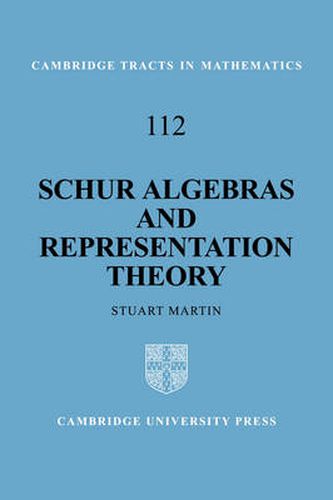Readings Newsletter
Become a Readings Member to make your shopping experience even easier.
Sign in or sign up for free!
You’re not far away from qualifying for FREE standard shipping within Australia
You’ve qualified for FREE standard shipping within Australia
The cart is loading…






Schur algebras are algebraic systems which provide a link between the representation theory of the symmetric and general linear groups (both finite and infinite). Dr Martin gives a full, self-contained account of this algebra and these links, covering both the basic theory of Schur algebras and related areas. He discusses the usual representation-theoretic topics such as constructions of irreducible modules, the blocks containing them, their modular characters and the problem of computing decomposition numbers; moreover deeper properties such as the quasi-hereditariness of the Schur algebra are also considered. The opportunity is taken to give an account of quantum versions of Schur algebras and their relations with certain q-deformations of the co-ordinate rings of general linear group. The approach is combinatorial where possible, thereby making the presentation accessible to graduate students. A few topics however require results from the representation theory of algebraic groups, so, to keep the book reasonably self-contained, an appendix on that is included. This is the first comprehensive text in this important and active area of research; it will be of interest to all research workers in representation theory.
$9.00 standard shipping within Australia
FREE standard shipping within Australia for orders over $100.00
Express & International shipping calculated at checkout
Schur algebras are algebraic systems which provide a link between the representation theory of the symmetric and general linear groups (both finite and infinite). Dr Martin gives a full, self-contained account of this algebra and these links, covering both the basic theory of Schur algebras and related areas. He discusses the usual representation-theoretic topics such as constructions of irreducible modules, the blocks containing them, their modular characters and the problem of computing decomposition numbers; moreover deeper properties such as the quasi-hereditariness of the Schur algebra are also considered. The opportunity is taken to give an account of quantum versions of Schur algebras and their relations with certain q-deformations of the co-ordinate rings of general linear group. The approach is combinatorial where possible, thereby making the presentation accessible to graduate students. A few topics however require results from the representation theory of algebraic groups, so, to keep the book reasonably self-contained, an appendix on that is included. This is the first comprehensive text in this important and active area of research; it will be of interest to all research workers in representation theory.